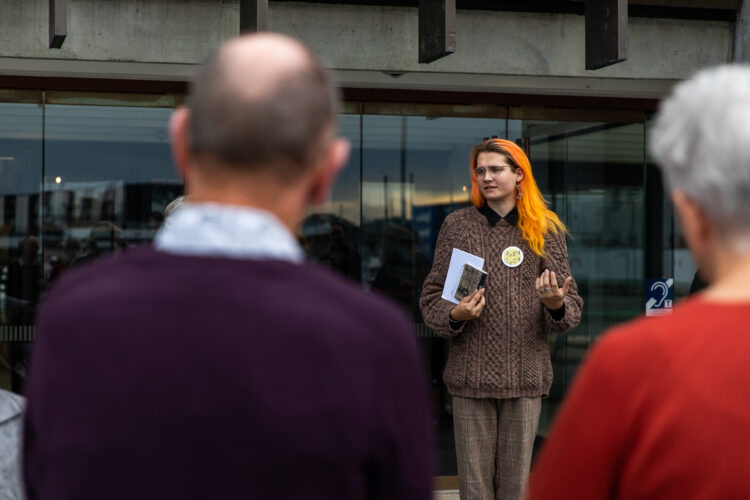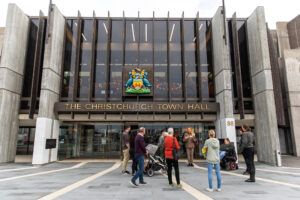
June 1st, 2023
Amplifying Accessibility
Introducing M Grace-Stent, and their mahi as part of an Open Christchurch and LinC Rourou collaboration. In M’s words, the collaboration “provided the support for me to undertake this work and focus on amplifying marginalised voices in a space where they are often overlooked”.
Tell us about Open Christchurch and your role in it.
Open Christchurch is a yearly festival in Ōtautahi that encourages people to engage with the architecture and design of the built environment in their city. My role as the Accessibility Advisor for the 2023 version of the event was to reach out to disabled communities that often found it difficult to participate in events such as Open Christchurch and empowering them to take part. My own experiences with being excluded and feeling unwelcome in the built environment have driven me to be passionate about this mahi and ensuring that people are able to feel connected to their city.
Accessibility information for all of the buildings and events for Open Christchurch 2023 was provided ahead of time. The accessibility programme included audio described tours, an accessible tour of New Brighton and a tour of the Christchurch Town Hall for architects and designers to better understand how accessibility can be accommodated in the design of buildings.
How do you see leadership reflected in this mahi?
Leadership is very important in the accessibility space, providing environments where people are able to share their experiences with either feeling unwelcome or having a space inaccessible to them is often the first step to meaningfully changing organisations and spaces. Providing a space of education and shared experience can take leadership, especially managing a range of backgrounds and perspectives. This was most obvious in the work creating a space for designers and architects to hear from members of the disabled community, including myself, about the Town Hall in central Ōtautahi.
What is the impact of meaningful inclusion and accessibility? For marginalised communities? For others?
It can tell people that they are welcome and that their points of view are seen as important to the kōrero and the spaces they are in. For marginalised communities, they often do not have many spaces where they feel welcomed in the wider community and feel like their voices can be heard. By providing this space, and listening to their perspectives, organisations can both learn a lot but also make connections with a whole range of different communities. Tapping into the energy and excitement of these groups to participate can lead to flourishing and long term positive relationships.

Photo credit: Erica Austin, Peanut Productions
Even just considering disabled people…this is not a monolithic group. Everyone has their own personal needs, wants and desires. Just thinking about the bare minimum can often lead to the experience feeling quite grim if people feel like they are an afterthought. People also have their own intersectional challenges that can mean participating can be difficult for reasons beyond the built environment. Asking questions and listening does not even need to be formal consultation. Sometimes the most can be gained through informal communication and outreach. Thinking broadly about accessibility and listening to the intersectional needs of people can be a deeply rewarding experience and mean that you don’t overlook the needs of anyone. Creating environments that are welcoming can often go a long way to cross these perceived boundaries and encourage a broad range of people who want to participate in your organisation, events and in your places.
How is your leadership growing and changing as a result of this project or other projects you are involved in?
Working on Open Christchurch 2023 as the accessibility advisor helped my leadership in so many ways. Here are some:
- Being able to have my voice heard and being able to put that voice to specific actions helped to solidify my passion for doing this mahi – as well as the importance that it has for a range of communities.
- Despite having accessibility as my passion and work, there is still much growth to be done with communities that I have a more distant connection to. Through this mahi and other projects I am working on, I am working to build relationships and broaden my perspective to make sure that I don’t become too blinkered and keep the big picture in mind. The process of building relationships and maintaining them is something that I think everyone should reflect on and how their own experiences connect with others.
How might others be leaders in this space?
I think that leadership around accessibility needs to start with small changes. Listening to the people involved is of course important, but there is also plenty that can be done on a smaller scale. Ensuring venues are accessible, adding alternative text to social media and emails, have quiet spaces available, building rest time into huis, are all things that can be done and go a long way to make lots more people feel seen and included in your spaces. Advocating for those who are unable to participate is also important but it can be harder.
Often the changes needed to make places accessible may not seem significant in the grand scheme of the built environment, but it can show people that they have been considered and acknowledged in the development and design of an event or the built environment. Some useful questions that I ask myself whenever I start thinking about a new place or event are:
- Who are you making the built environment accessible and inclusive for?
- Who are you wanting to participate?
- Have you listened to the communities you are trying to reach?
- How will the space feel to spend time in for everyone?
Ngā mihi,
M Grace-Stent (they/them)
Accessibility Advisor for Te Pūtahi on the Open Christchurch 2023 Festival
Supported by LinC Rourou
You can also connect with stories of impact from across our Leadership Lab ecosystem by signing up for this monthly pānui (see bottom of www.leadershiplab.co.nz ), joining our Leadership Lab LinkedIn page and browsing our website. Thanks heaps for your interest.

June 1st, 2023
Amplifying Accessibility
Introducing M Grace-Stent, and their mahi as part of an Open Christchurch and LinC Rourou collaboration. In M’s words, the collaboration “provided the support for me to undertake this work and focus on amplifying marginalised voices in a space where they are often overlooked”.
Tell us about Open Christchurch and your role in it.
Open Christchurch is a yearly festival in Ōtautahi that encourages people to engage with the architecture and design of the built environment in their city. My role as the Accessibility Advisor for the 2023 version of the event was to reach out to disabled communities that often found it difficult to participate in events such as Open Christchurch and empowering them to take part. My own experiences with being excluded and feeling unwelcome in the built environment have driven me to be passionate about this mahi and ensuring that people are able to feel connected to their city.
Accessibility information for all of the buildings and events for Open Christchurch 2023 was provided ahead of time. The accessibility programme included audio described tours, an accessible tour of New Brighton and a tour of the Christchurch Town Hall for architects and designers to better understand how accessibility can be accommodated in the design of buildings.
How do you see leadership reflected in this mahi?
Leadership is very important in the accessibility space, providing environments where people are able to share their experiences with either feeling unwelcome or having a space inaccessible to them is often the first step to meaningfully changing organisations and spaces. Providing a space of education and shared experience can take leadership, especially managing a range of backgrounds and perspectives. This was most obvious in the work creating a space for designers and architects to hear from members of the disabled community, including myself, about the Town Hall in central Ōtautahi.
What is the impact of meaningful inclusion and accessibility? For marginalised communities? For others?
It can tell people that they are welcome and that their points of view are seen as important to the kōrero and the spaces they are in. For marginalised communities, they often do not have many spaces where they feel welcomed in the wider community and feel like their voices can be heard. By providing this space, and listening to their perspectives, organisations can both learn a lot but also make connections with a whole range of different communities. Tapping into the energy and excitement of these groups to participate can lead to flourishing and long term positive relationships.

Photo credit: Erica Austin, Peanut Productions
Even just considering disabled people…this is not a monolithic group. Everyone has their own personal needs, wants and desires. Just thinking about the bare minimum can often lead to the experience feeling quite grim if people feel like they are an afterthought. People also have their own intersectional challenges that can mean participating can be difficult for reasons beyond the built environment. Asking questions and listening does not even need to be formal consultation. Sometimes the most can be gained through informal communication and outreach. Thinking broadly about accessibility and listening to the intersectional needs of people can be a deeply rewarding experience and mean that you don’t overlook the needs of anyone. Creating environments that are welcoming can often go a long way to cross these perceived boundaries and encourage a broad range of people who want to participate in your organisation, events and in your places.
How is your leadership growing and changing as a result of this project or other projects you are involved in?
Working on Open Christchurch 2023 as the accessibility advisor helped my leadership in so many ways. Here are some:
- Being able to have my voice heard and being able to put that voice to specific actions helped to solidify my passion for doing this mahi – as well as the importance that it has for a range of communities.
- Despite having accessibility as my passion and work, there is still much growth to be done with communities that I have a more distant connection to. Through this mahi and other projects I am working on, I am working to build relationships and broaden my perspective to make sure that I don’t become too blinkered and keep the big picture in mind. The process of building relationships and maintaining them is something that I think everyone should reflect on and how their own experiences connect with others.
How might others be leaders in this space?
I think that leadership around accessibility needs to start with small changes. Listening to the people involved is of course important, but there is also plenty that can be done on a smaller scale. Ensuring venues are accessible, adding alternative text to social media and emails, have quiet spaces available, building rest time into huis, are all things that can be done and go a long way to make lots more people feel seen and included in your spaces. Advocating for those who are unable to participate is also important but it can be harder.
Often the changes needed to make places accessible may not seem significant in the grand scheme of the built environment, but it can show people that they have been considered and acknowledged in the development and design of an event or the built environment. Some useful questions that I ask myself whenever I start thinking about a new place or event are:
- Who are you making the built environment accessible and inclusive for?
- Who are you wanting to participate?
- Have you listened to the communities you are trying to reach?
- How will the space feel to spend time in for everyone?
Ngā mihi,
M Grace-Stent (they/them)
Accessibility Advisor for Te Pūtahi on the Open Christchurch 2023 Festival
Supported by LinC Rourou
You can also connect with stories of impact from across our Leadership Lab ecosystem by signing up for this monthly pānui (see bottom of www.leadershiplab.co.nz ), joining our Leadership Lab LinkedIn page and browsing our website. Thanks heaps for your interest.

